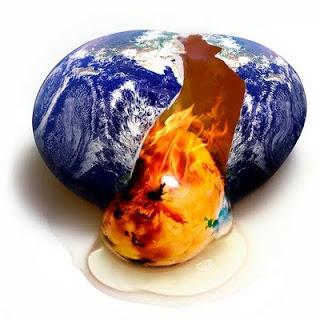 The Intergovernmental Panel on Climate Change (IPCC) concludes that this increase is very likely due to the "observed increase in anthropogenic greenhouse gas concentrations, which leads to the warming of the surface and lower atmosphere by increasing the greenhouse effect."
The Intergovernmental Panel on Climate Change (IPCC) concludes that this increase is very likely due to the "observed increase in anthropogenic greenhouse gas concentrations, which leads to the warming of the surface and lower atmosphere by increasing the greenhouse effect."For humans, these changes in climate are particularly dangerous to those who live near the ocean shore and who already suffer from drought, flooding, and poverty.
The IPCC concludes from models that global temperatures will likely rise by 1.1 to 6.4 C (2.0 to 11.5 F) degrees between 1990 and 2100, with the range of temperatures due to the use of differing scenarios of future greenhouse gas emissions and varying degrees of climate sensitivity.
Other effects of global warming include a rising sea level and changes in the amount and pattern of precipitation. In addition, there may be more frequent and intense weather events, such as more intense hurricanes, tornados, tsunamis, thunderstorms, blizzards, etc., though it is difficult to connect specific events to global warming.
Global warming is also causing changes in agricultural yields, glacier retreat, reduced summer stream flows, species extinctions, and increases in the ranges of disease vectors. The increased volumes of carbon dioxide and other greenhouse gases released by the burning of fossil fuels, land clearing, agriculture, and other human activities are the major reasons why global warming has been occurring and increasing over the last 50 years.
Effects of global warming are expected to cause more changes as it becomes more pronounced; examples include the following projected climate changes (from Wikipedia):
"A significant slowing of the ocean circulation that transports warm water to the North Atlantic; - Large reductions in the Greenland and West Antarctic Ice Sheets; - Accelerated global warming due to carbon cycle feedback in the terrestrial biosphere, and - Releases of terrestrial carbon from permafrost regions and methane from hydrates in coastal sediments."
It is uncertain whether for sure these events will occur or to what severity they will occur if they do, but most believe that the chances of at least one of the above events occurring are likely to increase the longer and more severe climate change becomes.
Some scientific members argue whether there will be positive effects from global warming, but most agree that any positive effects will be greatly outnumbered by the number of negative effects.
Projected climate changes due to global warming have the potential to greatly and irreversibly change our climate that will have lasting impacts on both the continental and global scales. One effect will be increased precipitation, due to the increasing temperature.
As Earth's temperature continues to rise, a very recent report from the IPCC shows that there will be an increasing impact to natural systems and people, especially those who live in Earth's poorer nations. In 2002, Colorado, Arizona, and Oregon endured their worst wildfire season ever. Also in 2002, drought created severe dust storms that caused hundreds of millions of dollars of damage in Texas, Montana, and North Dakota. Since the early 1950s, snow accumulation has decreased by 60%, which has led to some areas of the Cascade Range in Oregon and Washington to have shorter winter seasons.
As you can see, effects of global warming are very negative on our planet already, from increased air temperatures to rises in the sea level to more severe storms.
